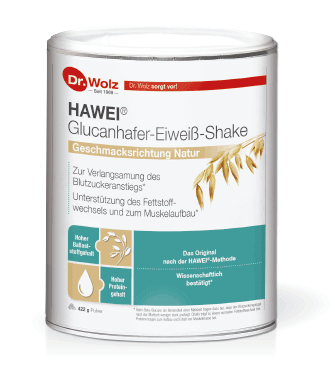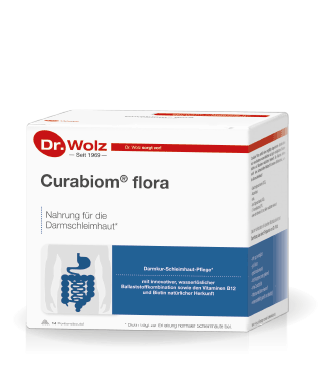Fibre is an indigestible component of plant-based foods and an essential part of a balanced diet. Although not absorbed by the body, fibre plays an important role in the digestive system. The German Nutrition Society (DGE) recommends a daily intake of at least 30 g of fibre ⁴ – yet many people do not meet this amount.
As a complement to a fibre-rich diet, the fibre supplements from Dr. Wolz offer an easy and natural way to support your daily intake.
What is fibre?
Fibre is a type of a carbohydrate that is difficult to digest and performs key functions in the human digestive system. It supports a healthy bowel function and helps increasing stool volume. Most fibre escapes digestion in the small intestine and passes into the colon, where it is either excreted or fermented by gut bacteria.
Fibre consists of various simple sugars, such as glucose, fructose, arabinose or ribose and is commonly found in the cell walls of plant-based foods – especially in whole grains, legumes, fruits and vegetables.
Depending on their physical properties, fibres are divided into soluble and insoluble types. Both types fulfil different roles and ideally complement each other in a balanced diet. ⁵ ⁶
Soluble and insoluble fibre: differences and effects
Fibre can be classified into two main groups depending on whether they dissolve in water:
- Soluble fibre: Examples include inulin, pectin and acacia fibre. These fibres can bind water and swell in the digestive tract. They help prolong the time food spends in the digestive system and serve as nourishment for certain gut bacteria.
- Insoluble fibre: Cellulose and lignin are examples. These fibres bind less water but still swell and stimulate bowel movement by increasing stool volume.
A mix of both types is ideal – therefore, a combination of different fibre sources is recommended.
How to include fibre in your everyday life
Getting enough fibre can be easy with a few simple changes:
- Choose whole grain products instead of white flour products
- Eat more vegetables, legumes and fruit
- Use nuts and seeds as toppings
- Drink plenty of fluids – fibre needs water!
Frequently Asked Questions about Fibre (FAQ)
Fibre is an indigestible carbohydrate found in plant-based foods like whole grains, vegetables, legumes, and fruits. It plays a key role in the body – especially for a healthy digestion.
Since fibre is not completely broken down in the small intestine, it largely reaches the colon intact, where it is either excreted or fermented by certain gut bacteria.
Depending on the type and source, fibre supports various processes in the digestive system.
Fibre is found exclusively in plant-based foods – especially in unprocessed or minimally processed ones. Good sources include:
- Whole grain products like wholemeal bread, pasta or brown rice
- Oats and other whole grain cereals
- Legumes, such as lentils, chickpeas, beans or peas
- Vegetables, especially cabbage varieties, carrots, broccoli and celery
- Fruits, especially berries, apples and pears (with skin)
- Nuts and seeds, e.g. almonds, flaxseeds or chia seeds
- Natural plant fibres, such as inulin, acacia fibre or psyllium husks
A varied, plant-based diet is key to reaching the DGE’s recommended minimum of 30 g of fibre per day. ⁴
The DGE recommends at least 30 g of fibre per day – a diverse, plant-based diet helps achieve that. ⁴
Yes – it’s important to drink enough fluids, as fibre binds water.
1 Oat beta-glucans, as part of a meal, contribute to a reduced rise in blood glucose after that meal. This effect occurs with a daily intake of at least 4 g of oat beta-glucans per 30 g of available carbohydrates (CHO).
2 Choline contributes to a normal fat metabolism.
3 Proteins contribute to the maintenance and growth of muscle mass.
4 https://www.dge.de/wissenschaft/referenzwerte/ballaststoffe/
5 Biesalski, H.K., and Grimm, P. (2020). Taschenatlas der Ernährung (Georg Thieme Verlag).
6 Leitzmann, C. (2009). Ernährung in Prävention und Therapie: ein Lehrbuch (Hippokrates-Verlag).



![[Translate to English:] Ballaststoffe [Translate to English:] Ballaststoffe](/fileadmin/user_upload/Ballaststoffe.png)
